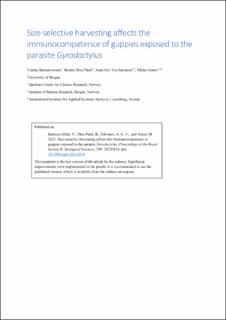Size-selective harvesting affects the immunocompetence of guppies exposed to the parasite Gyrodactylus
Journal article, Peer reviewed
Accepted version

View/
Date
2022Metadata
Show full item recordCollections
- Department of Biological Sciences [2279]
- Registrations from Cristin [10237]
Original version
Proceedings of the Royal Society of London. Biological Sciences. 2022, 289 (1981), 20220534. 10.1098/rspb.2022.0534Abstract
Harvesting is typically size-selective, targeting large individuals. This is expected to lead to reduced average body size and earlier maturation (i.e. faster life histories). Such changes can also affect traits seemingly unrelated to harvesting, including immunocompetence. Here we test four hypotheses on how harvesting affects immunocompetence based on the pace-of-life syndrome, habitat area limitation and energy allocation and acquisition, respectively. We empirically evaluate these hypotheses using an experimental system consisting of the ectoparasite Gyrodactylus turnbulli and lines of guppies Poecilia reticulata that had been subjected to either small, random or large size-selective harvest for over 12 years. We followed the infection progression of individually infected fish for 15 days. We found significant differences between the harvested lines: fish from the small-harvested lines had the highest parasite loads. During the early phase of the infection, parasite loads were the lowest in the large-harvested lines, whereas the terminal loads were the lowest for the random-harvested lines. These results agree with the predictions from the energetic trade-off and surface area hypotheses. To our knowledge, this is the first demonstration of the consequences of size-selective harvesting on immunocompetence.